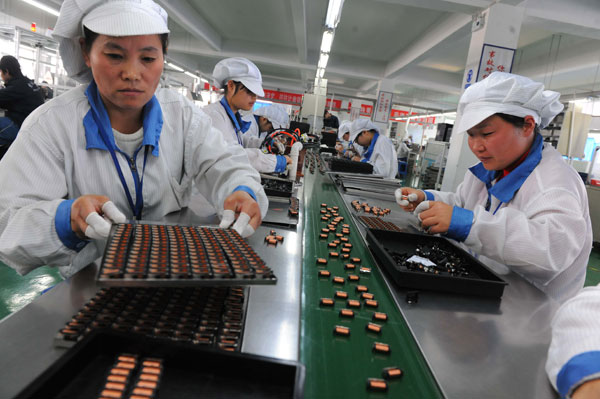Solar firm weathers storm with sound principles
Updated: 2013-12-25 09:20
By Zheng Yangpeng (China Daily)
|
|||||||||||
|
 Workers install photovoltaic products in Lianyungang, Jiangsu province. After two years of a chilly market caused by overcapacity and trade disputes with the EU and US, global demand in the industry is rising once more. Geng Yuhe / for China Daily |
There is a kind of company that will never be the rock star of an industry. Unlike the luminaries that rise and fall precipitously, these quiet fortunes start from humble beginnings and progress slowly and steadily. Rarely do they make headlines, but they are able to dodge risks and survive the worst crises.
Changzhou-based Trina Solar Ltd is one such company.
Among the four biggest photovoltaic product manufacturers, Trina, along with the rest of the PV industry in China, is on a road to recovery: In the third quarter, the company saw its first net profit in several years.
After a two-year cold spell caused by overcapacity and a trade war with the EU and US, global demand in the industry is rising once more.
As for Trina, its production lines are running at full speed. In fact, so many orders have come in that it has had to outsource some business to other manufacturers, according to the company's executives.
This is in stark contrast with a year ago, when solar panel prices plunged, and virtually every PV company suffered huge losses.
Wuxi Suntech Power Co, once the shining star of China's PV sector, expanded aggressively before the bottom fell out, then failed to cover its debts and had to enter into bankruptcy proceedings this March.
Other manufacturers faced similar trajectories: The tide rose, promising ceaseless growth, enthusiastic investors and local governments with money to spend it was hard to resist the temptation of adding investment. Then came the 2008 financial crisis, and everything changed. Overcapacity and bad debts became bywords of the industry.
When the tide ebbs, it is time to see who is swimming naked on the beach.
"The problem with China's PV industry is that few companies have core competitiveness, which is what keeps you from being copied by other people," said Steven White, associate professor at Department of Innovation, Entrepreneurship and Strategy of Tsinghua University.
"Overcapacity occurs when too many people are making the same thing," White said. "But during the boom, companies were tempted to expand their capacity."
Trina was among the few that resisted that temptation.
Gao Jifan, Trina's CEO, told China Daily that at the end of 2007, board members of the company, some from the US, sensed a looming crisis as mortgage giants Fannie Mae and Freddie Mac began melting down. They felt that the economy could dip soon and that investment should be particularly cautious.
As a result, a $1 billion polysilicon project in Shanghai was canceled even while many other PV firms were competing to invest heavily in similar projects.
Gao attributed Trina's caution to the company's inherent management culture.
"From the very beginning, we have never aimed to be the largest in the industry. Instead, we pursue 'sustainable development", he said.
The dovish stance that kept Trina from becoming a shining star in the sunny days also helped it to be better-positioned when it rained: Giants that expanded recklessly are now dealing with heavy debts, a major factor weighing on them besides plummeting prices.
But thanks to a lighter financial burden and better cost control, Trina lost less money in the chilliest times.
Related readings:
China's new solar capacity for 2013 to hit 10 GW
China solar panel makers turn to solar farm
Brighter outlook for solar power sector
Rare solar eclipse 2013
Trina Solar survives its biggest hurdle
Related Stories
Rescuing solar power 2013-10-09 14:30
Chinese solar power companies sued in the US 2013-10-10 07:21
New policy boosts construction of solar plants 2013-09-13 16:21
Nation set to become the world's largest solar power 2013-09-12 07:53
Today's Top News
Delicious, festive holiday choices abound for expats
Tight budgets of the elderly cause issues
Mend ties, top adviser tells Tokyo
Pearl Delta FTZ plan goes to Cabinet
Caregivers in high demand
City seeks to cut costs for private care
Experts defend hepatitis B program
Dependency on natural gas imports rises
Hot Topics
Lunar probe , China growth forecasts, Emission rules get tougher, China seen through 'colored lens', International board,
Editor's Picks

|

|

|

|

|

|





